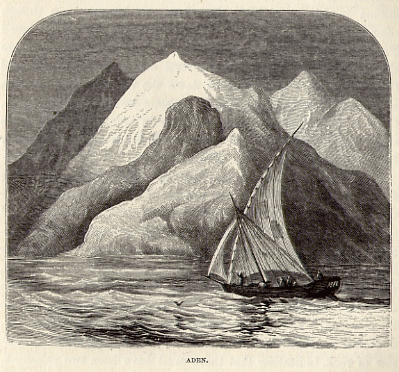
Illustration from Seward’s Travels (1873)
William H. Seward, the American Secretary of State who is forever linked with the “folly†of acquiring Alaska from the Russians, spent a year traveling around the world near the end of his life. In a previous post I recorded his comments on the British rule in India, as reported by his daughter. On April 27, 1871 the Seward party neared the Yemeni port (and British fueling station) of Aden. Here is how the approach is recorded by Ms. Seward:
April 27th. – After eight months travel in the incomprehensible East, with its stagnant civilization, we are now passing into another region still more incomprehensible and hopeless.
On the right hand is Yemen, once ‘Arabia the happy,’ and still known in poetry as a land of light and beauty, but now the dwelling of Arab hordes, who are sinking every day deeper into barbarism. On the left, wee are passing Somali, that part of Africa which stretches from Mozambique to Abyssinia. It is inhabited by aboriginal negro tribes, which, from the beginning of time, have defied civilization. Thus we have the same experience, in our approach to Europe, as when we listen to a vague and confused prelude which precedes the full harmony of a symphony. (p. 470)
Sinking deeper into barbarism? I suppose this means that resistance to Christianity by the Muslim population is worse than just being pagans from the start. Indeed both the Arabs and Somalis would defy a brand of civilization that assumed only Christian Europeans (and only certain kinds of those) have such an imperially based commodity. Clearly Ms. Seward is nostalgic for Mozart, but what would she do when Stravinsky brings his Rite of Spring to the early 20th century? But on to Aden, through the tint of British elitism:
Aden, thus hollowed into basin-shape, is joined to the Arabian coast by a low and a very narrow isthmus – a place so entirely desolate it has never before been our fortune to see. On it, or in it (which will you have?), there is not a tree nor a plant, except where, here and there, is a patch which man’s hand has planted, scarcely bigger than that hand, and which he continues to water daily. The Portuguese discoverers stopped here on their voyages of exploration. They found here, as at Socotra, a colony of Syrian Christians. The Mohammedans from Mecca invaded them with fire and sword. They invoked relief and protection from the Portuguese Indian capital at Goa. The Portuguese interventiomn proved ineffectual, and the promontory remained under native Arabian sway, and ultimately cam to be a province of Muscat. The kings of Muscat lost it, as they lost every thing, and the promontory rfemained under the control of native chiefs. The British Government early saw its importance to their Indian dominions, but awaited an opportunity. In 1839, under the pretext of redressing an insult, Great Britain, with sword in one hand, and a liberal purse in the other, seized the promontory and fortified it. It is now used as a coaling-station in the European voyages to India, whether they are made around the Cape of Good Hope, or through the Red Sea…
Wise old England! How she fortifies her Island Realm, and yet all the while develops and improves the energies of her people, while she does not hesitate to undertake the police regulation of the world! She knows, moreover, when and how to establish the necessary police-stations. If jealous of the Untied States, what could she desire more than that they shall be content with complaining of the Alabama grievances, hesitate at taking a police-station in Alaska, and utterly refuse to take one, even though offered, in the West Indies. That hesitation and refusal recall President Lincoln’s story of the intrusion of the Universalists into the town of Springfield. The several orthodox churches agree that their pastors should preach down the heresy. One of them began his discourse with these emphatic words: ‘My brethren, there is a dangerous doctrine creeping in among us. There are those who are teaching that all men will be saved; but, my dear brethren, we hope for better things.’
Aden is a fortification and a harbor, and nothing more… The heat is so constant, as well as so intense, as to suggest the apprehension of new subterranean fires. Sometimes three years pass without the blessing of rain. It is, therefore, a sever study of the government to provide fresh water for town, garrison, and shipping. The earlier owners of Arabia had a considerable city within the basin, which they supplied with water by collecting the rain which occasionally fell on the crests and interior declivities, and conducting it to a dozen tanks or reservoirs. The water thus gathered and hoarded from tropical tempests would be sufficient, if left to its natural flow, to deluge the bottom of the basin. These reservoirs remain in perfect preservation, and are admired for their masonry. The walls of each bear a tablet on which it is stated its capacity in gallons. The supply furnished by these ancient reservoirs, is quite inadequate to the present demand of the town, which is provided for by the use of steam-condensers of sea-water. It is a curious thing to see English artisans here using coal from Cornwall, to extract water from the ocean to slake the thirst of the savages of Asia and Africa. Who shall question that the British people are a commercial one, when he learns that the government at Aden sells the water, which it thus manufactures, at a penny a gallon.
Excerpts from Olive Risley Seward, editor, William H. Seward’s Travels around the World (New York: Appleton and Company, 1873).